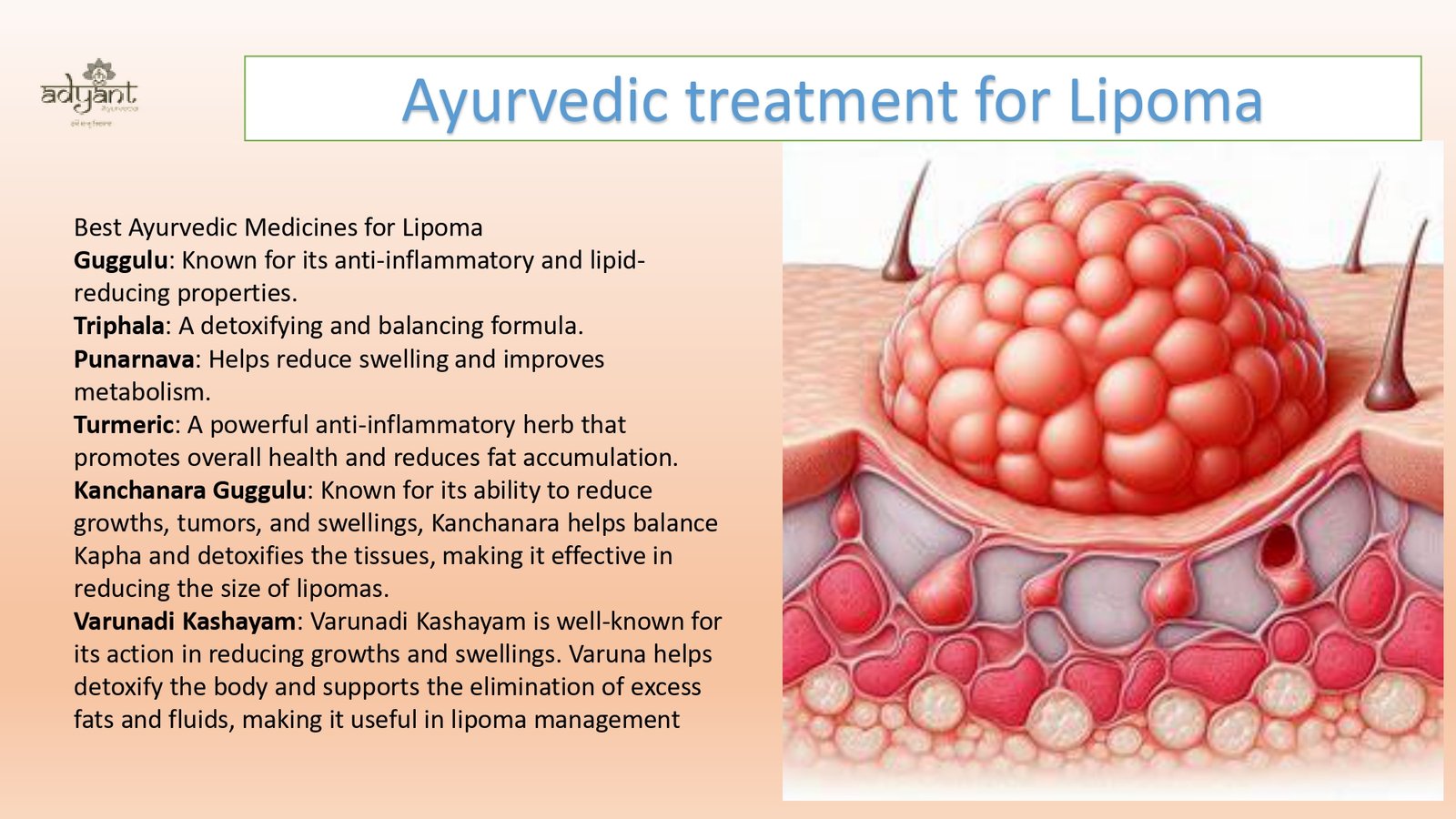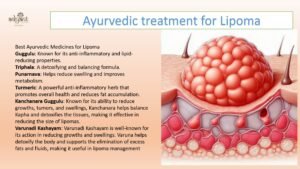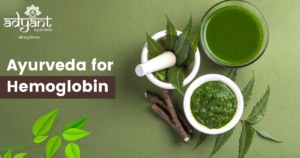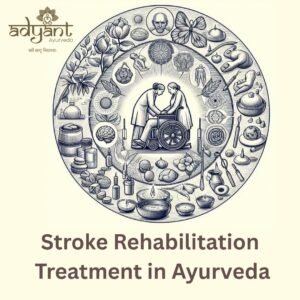Table of Contents
Toggle🧭 Introduction
When a lump develops, it is always concerning. But not all lumps are harmful. A lipoma, a soft, doughy lump under your skin, may be benign, but it can still cause discomfort or cosmetic concerns. Lipomas are benign (non-cancerous) tumors made of adipose tissue.
In Ayurveda, lipomas are correlated with Medoja Granthi, with similar symptoms and doshic imbalances. While modern medicine recommends surgical removal or observation, Ayurvedic treatment for lipoma proposes natural remedies and lifestyle modifications. This blog explores the holistic Ayurvedic approach to managing lipomas using non-invasive techniques.
For Free Consultation with top Ayurvedic Doctors, download our app from the Play Store “AyurCare“
🧬 Lipoma from the Ayurveda Perspective
Lipomas are referred to as Medoja Granthi in Ayurveda — benign nodular swellings due to Kapha and Vata imbalances.
Characteristics:
Soft, movable, and painless
Slowly growing, subcutaneous masses
Most commonly seen on arms, back, torso, and neck
According to Ayurvedic texts, these are types of Granthi Roga – nodular swellings caused by Srotorodha (blockage of body channels), particularly those related to fat tissue.
🩺 Diagnosis of Lipoma in Ayurveda
Ayurvedic diagnosis focuses on understanding the root cause and bodily imbalance:
Nadi Pariksha (Pulse Diagnosis) – Detects doshic disturbance
Ashtavidha Pariksha – Involves tongue, pulse, urine, eyes, and skin assessment
Rogi-Roga Pariksha – Analysis of the patient’s constitution and disease progression
This diagnostic method allows for customized treatment tailored to the patient’s unique constitution and imbalances.
🧠 Causes of Lipoma
🔬 Modern Understanding:
Genetic predisposition
Sedentary lifestyle
Obesity
Hormonal imbalance
Poor dietary habits
🌿 Ayurvedic View:
Agnimandya (poor digestion) leading to Ama (toxins)
Vitiation of Kapha dosha, which governs fluids and fat
Influence of Vata dosha, making the tumors movable and painless
Srotorodha (blocked channels) due to Kapha accumulation
Excessive intake of heavy, oily, sweet foods
Lack of physical activity
🧩 Symptoms of Lipoma
Soft, doughy lumps under the skin
Usually painless
Mobile when touched
Mostly located on the arms, torso, or neck
Slow-growing, often less than 5cm in size
Lipomas are generally harmless but may cause cosmetic issues or pain if pressing against a nerve.
🌿 Ayurveda Treatment for Lipoma
Ayurveda treats lipomas through internal medicines, external applications, and minimally invasive procedures that address the root cause.
🔑 Key Treatments:
Ksharasutra Therapy: Herbal alkaline thread used to ligate and reduce lipomas without surgery
Agnikarma: Thermal cauterization to reduce the lipoma size
Internal Medicines: Herbs like Guggulu, Trikatu, Triphala, and Kanchnar Guggulu with Lekhana (scraping) properties
Panchakarma Therapies: Detoxification with Vamana, Virechana, and Lekhana Basti
Udwarthanam: A deep tissue massage with herbal powders, promoting fat metabolism under the skin
Triphala Kala Basti: Medicated enema with Triphala to detoxify the body and balance doshas
Topical Applications (Lepa): Herbal pastes to shrink lipomas
Abhyanga (Ayurvedic Massage): Improves circulation and fat metabolism
🥗 Ayurvedic Diet & Lifestyle Recommendations
✅ Do’s:
Eat warm, light, and easily digestible foods
Use spices like turmeric, ginger, and black pepper
Drink warm water and detox teas (ginger, coriander, cumin)
Exercise daily
❌ Don’ts:
Avoid oily, fried, and dairy-heavy food
Say no to sugar-loaded items
Avoid daytime naps and a sedentary lifestyle
🌱 Ayurvedic Herbs for Lipoma
| Herb | Benefits |
|---|---|
| Guggulu | Reduces fat deposits, anti-inflammatory |
| Kanchnar Guggulu | Shrinks glandular swellings and tumors |
| Haridra (Turmeric) | Anti-inflammatory, detoxifying |
| Trikatu | Enhances digestion and fat metabolism |
| Triphala | Mild laxative and detoxifier |
⚖️ Modern Medicine vs Ayurveda for Lipoma
| Aspect | Modern Medicine | Ayurveda |
| Approach | Observation/Surgery | Root cause treatment + symptom management |
| Side Effects | Scarring, infection | Minimal with natural remedies |
| Recurrence | Possible | Prevented through detox and lifestyle change |
| Focus | Removal | Systemic correction and prevention |
📍 Why Choose Adyant Ayurveda for Lipoma Treatment?
24+ years of experience in Panchakarma and Ayurveda
Advanced Ksharasutra and Agnikarma therapies
Expert doctors in non-surgical lipoma treatment
Four centers in Jayanagar, Indiranagar, Kalyan Nagar, and Rajarajeshwari Nagar
Affordable packages and online consultations available 📞 Call now to book: 9972541009
🧘♀️ Conclusion
Ayurveda offers a natural, holistic approach to lipoma management. From internal detox and herbal medicines to external treatments like Ksharasutra and Agnikarma, the focus is on addressing the root cause, preventing recurrence, and improving overall health.
Looking for the best Ayurvedic treatment for lipoma in Bangalore? Visit Adyant Ayurveda – where healing meets tradition.
📞 Call now to consult our expert Ayurvedic doctors: 9972541009
 Frequently Asked Questions (FAQs)
Frequently Asked Questions (FAQs)
1. Is lipoma curable in Ayurveda?
Ayurveda can help manage and reduce lipomas using internal medicines, detox therapies, and lifestyle changes. Complete resolution depends on the size and duration of the lipoma.
2. How can I dissolve lipoma naturally?
Through herbal medicines, Ksharasutra, Agnikarma, and Panchakarma therapies along with proper diet and exercise.
3. Can lipoma be treated without surgery?
Yes, Ayurveda offers minimally invasive procedures and internal medicines to treat lipomas without the need for surgery.
4. How to stop lipoma from spreading?
By maintaining a Kapha-pacifying diet, regular detoxification, and avoiding sedentary habits and fatty foods.
5. What herbs are used in Ayurveda for lipoma?
Kanchnar Guggulu, Triphala, Trikatu, Guggulu, Haridra are commonly used.







